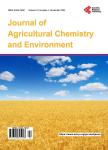Production of reactive oxygen species by freezing stress and the protective roles of antioxidant enzymes in plants
Production of reactive oxygen species by freezing stress and the protective roles of antioxidant enzymes in plants作者机构:School of Biotechnology Yeungnam University Gyeongsan South Korea USDA/ARS Department of Crop and Soil Sciences Washington State University Pullman USA
出 版 物:《Journal of Agricultural Chemistry and Environment》 (农业化学和环境(英文))
年 卷 期:2012年第1卷第1期
页 面:34-40页
学科分类:1002[医学-临床医学] 100214[医学-肿瘤学] 10[医学]
主 题:Antioxidant Enzymes Cold Acclimation Freezing Stress Manganese Superoxide Dismutase Reactive Oxygen Species
摘 要:As one of the most severe environmental stresses, freezing stress can determine native flora in nature and severely reduce crop production. Many mechanisms have been proposed to explain the damage induced by freezing-thawing cycle, and oxidative stress caused by uncontrollable production of harmful reactive oxygen species (ROS) are partially contributed to causing the injury. Plants in temperate regions have evolved a unique but effective metabolism of protecting themselves called cold acclimation. Cold-acclimating plants undergo a complex but orchestrated metabolic process to increase cold hardness triggered by exposure to low temperature and shortened photoperiod and achieve the maximum freezing tolerance by a concerted regulation and expression of a number of cold responsive genes. A complicated enzymatic system have been evolved in plants to scavenge the ROS to protect themselves from oxidative stress, therefore, cold-acclimating plants are expected to increase the de novo synthesis of the genes of antioxidant genes. Indeed, many antioxidant genes increase the expression levels in response to low temperature. Furthermore, the higher expression of many antioxidant enzymes are positively correlated to inducing higher tolerance levels against freezing. All the information summarized here can be applied for developing crop and horticultural plants to have more freezing tolerance for higher production with better quality. There have been extensive studies on the activities of antioxidant enzymes and the gene regulation, however, more researches will be required in near future to elucidate the most effective antioxidant enzymes to induce highest freezing tolerance in a crop plant in a transformation process or a breeding program.



